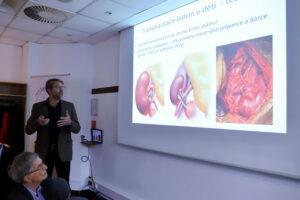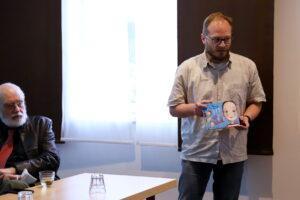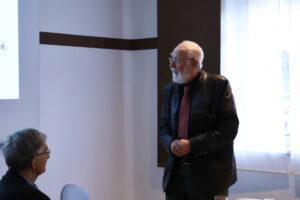For decades, the National Kidney Transplant Program for Children at the Motol University Hospital has given small patients great hope for another full and quality life, including starting a family and the joy of healthy offspring.
The kidney donor is in most cases an adult deceased donor. The Czech transplant program prefers children on the waiting list when allocating the kidneys of deceased donors, so that the kidneys of "ideal donors" are transplanted. Only about 10% of transplant patients obtain an organ from a living donor. It is usually the parent or relative of the patient. The average waiting time for the kidney of a deceased donor is only 6-8 months, in adults it is about 14 months.
Even the global pandemic COVID-19 did not prevent the operation of this program, which is unique in the Czech Republic. Only at the beginning of 2020 was the pediatric kidney transplant program briefly interrupted for a period of about one month. Therefore, both the donor and the recipient must be tested by PCR. If positivity is found, the institution's offer would have to be rejected. But this has not happened yet.
Kidney transplantation is the most optimal replacement of kidney function in case of chronic failure and its final phase. Renal function can also be temporarily replaced by dialysis (peritoneal or hemodialysis), which can ensure a good quality of life in adult patients. For children, however, no cleansing method has yet ensured growth, education and full integration into society. Therefore, the current trend is ideally to transplant before the child has to be dialyzed (so-called preemptive transplantation). The most common diagnosis leading to end-stage chronic kidney failure is congenital kidney defects. This is followed by chronic glomerulonephritis - immunological renal inflammation, cystic kidney disease and hereditary nephropathy.
 In the case of a transplant, a small patient must first undergo a very detailed and fully comprehensive examination. It mainly includes laboratory examinations, as well as various imaging examinations, such as ultrasound of the abdomen and large vessels, or urological examinations, which assess the condition and quality of the urinary tract, or other professional advice. A detailed psychological examination is also very important, due to the cooperation in the post-transplant period. It is necessary to explain to the patient and his family at this time that the transplant does not end the worries, on the contrary, complicated care of the transplanted organ begins, requiring the cooperation of the child, family and all those involved in the care of the transplant. The most important thing is the careful use of drugs, especially immunosuppressants. The results of all these examinations are then assessed by the transplant surgeon. It chooses the optimal surgical technique and procedure (placement of the transplanted kidney) and determines the donor weight limit, according to which the Coordination Center for Transplantation offers a suitable organ.
In the case of a transplant, a small patient must first undergo a very detailed and fully comprehensive examination. It mainly includes laboratory examinations, as well as various imaging examinations, such as ultrasound of the abdomen and large vessels, or urological examinations, which assess the condition and quality of the urinary tract, or other professional advice. A detailed psychological examination is also very important, due to the cooperation in the post-transplant period. It is necessary to explain to the patient and his family at this time that the transplant does not end the worries, on the contrary, complicated care of the transplanted organ begins, requiring the cooperation of the child, family and all those involved in the care of the transplant. The most important thing is the careful use of drugs, especially immunosuppressants. The results of all these examinations are then assessed by the transplant surgeon. It chooses the optimal surgical technique and procedure (placement of the transplanted kidney) and determines the donor weight limit, according to which the Coordination Center for Transplantation offers a suitable organ.
 "In the Czech Republic, children weighing 10 kg and more are transplanted, and in a children's center, a child can be transplanted until they reach their 19th birthday. The average age of a child kidney recipient is 13, " says MUDr. Jan Burkert, Ph.D., Head of the Department of Transplantation and Tissue Bank, Motol University Hospital, transplant surgeon of the National Kidney Transplant Program in Children and the National Lung Transplant Program. According to him, the weight limit is set for a purely practical reason. "If you are transplanting a kidney to an adult donor's kidney, we need to make sure it fits in the baby's tummy. The large kidney also restricts breathing. The anesthesiologist during the operation and the intensivists in the postoperative period must ensure that the child's circulation ensures sufficient blood flow through the transplanted kidney, which needs 30-45% of the patient's cardiac output for its operation. The low frequency of kidney transplants in children and the described difficulties in postoperative and postoperative care are the reason why this program was centralized in the largest Czech hospital with the most complete pediatric, counseling, laboratory and technical facilities. Importantly, if, despite all care, the graft fails, dialysis treatment is initiated and the patient can, in the vast majority of cases, undergo retransplantation. Fortunately, this usually only happens after many years, most often after reaching adulthood, " adds Mayor Burkert.
"In the Czech Republic, children weighing 10 kg and more are transplanted, and in a children's center, a child can be transplanted until they reach their 19th birthday. The average age of a child kidney recipient is 13, " says MUDr. Jan Burkert, Ph.D., Head of the Department of Transplantation and Tissue Bank, Motol University Hospital, transplant surgeon of the National Kidney Transplant Program in Children and the National Lung Transplant Program. According to him, the weight limit is set for a purely practical reason. "If you are transplanting a kidney to an adult donor's kidney, we need to make sure it fits in the baby's tummy. The large kidney also restricts breathing. The anesthesiologist during the operation and the intensivists in the postoperative period must ensure that the child's circulation ensures sufficient blood flow through the transplanted kidney, which needs 30-45% of the patient's cardiac output for its operation. The low frequency of kidney transplants in children and the described difficulties in postoperative and postoperative care are the reason why this program was centralized in the largest Czech hospital with the most complete pediatric, counseling, laboratory and technical facilities. Importantly, if, despite all care, the graft fails, dialysis treatment is initiated and the patient can, in the vast majority of cases, undergo retransplantation. Fortunately, this usually only happens after many years, most often after reaching adulthood, " adds Mayor Burkert.
After the transplant, the child is hospitalized for approximately 3-4 weeks. This is followed by only inspections in a specialized pediatric nephrology clinic. Initially more often, ie about once a week, in the longer term then only at intervals of once a month.
 Children usually return to school 8 weeks after the transplant. They must drink enough, but otherwise have only minimal dietary restrictions due to immunosuppressive therapy. "Some patients tend to be overweight after a transplant. Therefore, physical activity and a rational diet are an integral part of our recommendations. Above all, we want the patient to be able to lead a normal life after the transplant with as few restrictions as possible, " points out doc. MUDr. Jakub Zieg, Ph.D., Chief Physician of the National Kidney Transplant Program in Children and the Nephrology Department of the Pediatric Clinic of the 2nd Medical Faculty of Charles University and the Motol University Hospital. In addition to immunosuppressants, ie drugs to suppress immunity, which prevent the rejection (so-called rejection) of the transplanted organ, other common drugs include antihypertensives (drugs to lower blood pressure).
Children usually return to school 8 weeks after the transplant. They must drink enough, but otherwise have only minimal dietary restrictions due to immunosuppressive therapy. "Some patients tend to be overweight after a transplant. Therefore, physical activity and a rational diet are an integral part of our recommendations. Above all, we want the patient to be able to lead a normal life after the transplant with as few restrictions as possible, " points out doc. MUDr. Jakub Zieg, Ph.D., Chief Physician of the National Kidney Transplant Program in Children and the Nephrology Department of the Pediatric Clinic of the 2nd Medical Faculty of Charles University and the Motol University Hospital. In addition to immunosuppressants, ie drugs to suppress immunity, which prevent the rejection (so-called rejection) of the transplanted organ, other common drugs include antihypertensives (drugs to lower blood pressure).
 A novelty in the care of small transplant patients is a children's information publication. It was created in cooperation with the project "I am your new friend", which aims to improve the post-transplant condition of pediatric patients. Its founder is Ing. Štěpán Kadlec, who is alone, now 11 years old, after a liver transplant. "The project started at Thomayer Hospital. It started with the liver, which is my heart, so there was nothing to think about. Because the liver and kidneys are the most commonly transplanted organs. It was clear that we will focus mainly on them, "says Ing. Štěpán Kadlec and adds: "I especially appreciate books for small patients, one of the two main gifts that are part of a backpack for a small patient."
A novelty in the care of small transplant patients is a children's information publication. It was created in cooperation with the project "I am your new friend", which aims to improve the post-transplant condition of pediatric patients. Its founder is Ing. Štěpán Kadlec, who is alone, now 11 years old, after a liver transplant. "The project started at Thomayer Hospital. It started with the liver, which is my heart, so there was nothing to think about. Because the liver and kidneys are the most commonly transplanted organs. It was clear that we will focus mainly on them, "says Ing. Štěpán Kadlec and adds: "I especially appreciate books for small patients, one of the two main gifts that are part of a backpack for a small patient."
 The first kidney transplant in the former Czechoslovakia took place in Hradec Králové in 1961. The first successful one was then performed at IKEM Prague in 1966. The children's transplant program was prepared by the team of the 1980st Children's Clinic of the Motol University Hospital under the leadership of prof. Jandy. In 3, they launched a children's dialysis program. The first 1977 kidney transplants in children were performed in the years 1981 - 1981 in IKEM Prague. The well-known fact that the child is not a small adult and that the pediatric patient needs the facilities of a large children's hospital was confirmed. This was realized by prof. Kočandrle, head of the IKEM transplant program, in 1981 addressed the director of the Motol University Hospital, MUDr. Zelinger and the pediatric program was transferred to the Motol University Hospital. The first transplant was performed in November XNUMX by prof. Kočandrle (IKEM), assisted by Dr. Špatenka, Children's Cardiac Center and doc. Krolupper, Department of Pediatric Surgery.
The first kidney transplant in the former Czechoslovakia took place in Hradec Králové in 1961. The first successful one was then performed at IKEM Prague in 1966. The children's transplant program was prepared by the team of the 1980st Children's Clinic of the Motol University Hospital under the leadership of prof. Jandy. In 3, they launched a children's dialysis program. The first 1977 kidney transplants in children were performed in the years 1981 - 1981 in IKEM Prague. The well-known fact that the child is not a small adult and that the pediatric patient needs the facilities of a large children's hospital was confirmed. This was realized by prof. Kočandrle, head of the IKEM transplant program, in 1981 addressed the director of the Motol University Hospital, MUDr. Zelinger and the pediatric program was transferred to the Motol University Hospital. The first transplant was performed in November XNUMX by prof. Kočandrle (IKEM), assisted by Dr. Špatenka, Children's Cardiac Center and doc. Krolupper, Department of Pediatric Surgery.
Case report:
Matthew, 11 years old
In the first year of age, increased liver tests and the finding of a parenchymal kidney lesion were accidentally found in Matouš. Therefore, at the age of two, he underwent a liver biopsy, which confirmed liver fibrosis, and in the laboratory he was also found to have reduced kidney function. Three years later, a genetic examination was performed on the basis of an ultrasound examination, which revealed small cysts on the kidneys. This confirmed the finding of an inherited disease (infantile nephronophthisis), which affects both the liver and kidneys. Finally, at about the age of seven, it was necessary to start chronic peritoneal dialysis. After 6 months, ie at about 8 years, Matouš had a kidney transplant from an inanimate donor. The post-transplant course was without major complications, only doctors had to adjust his immunosuppressive treatment due to a transient increase in liver tests. Matouš is also monitored on an outpatient basis without major complications. This was confirmed by a recent biopsy of the transplanted kidney, which did not reveal any rejection changes.
Rastislav, 43 years old
Rasťa comes from Košice, where he has been monitored and treated by pediatric nephrologists since the age of six. Due to the fact that FN Motol at that time had experience with 6 kidney transplants in children with excellent results, transplantation was arranged in our country. That was Rasta 16 years old. He graduated from elementary school, graduated from high school, successfully completed the Medical Faculty of UPJŠ in Košice and chose the specialization of surgery. He became a member of a transplant group, today he transplants independently, even children!
Press Release:
TZ - tx of the kidney in children (232,96 KB)
TZ - patients (281,40 KB)